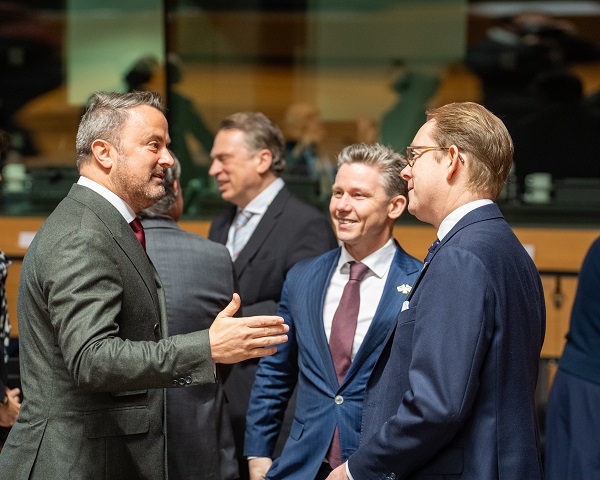 (L-R) Xavier Bettel, Luxembourg's Deputy Prime Minister, Minister for Foreign Affairs and Foreign Trade; Pal Jonson, Swedish Minister of Defence; Tobias Billström, Swedish Minister for Foreign Affairs;
Credit: MAE
(L-R) Xavier Bettel, Luxembourg's Deputy Prime Minister, Minister for Foreign Affairs and Foreign Trade; Pal Jonson, Swedish Minister of Defence; Tobias Billström, Swedish Minister for Foreign Affairs;
Credit: MAE
As reported by the public authorities, Luxembourg's Deputy Prime Minister and Minister for Foreign Affairs and Foreign Trade, Xavier Bettel, and the Minister of Defence, Yuriko Backes, participated in the meeting of the Foreign Affairs Council (FAC) of the Council of the European Union, which was held at the European Convention Center Luxembourg on Monday 22 April 2024.
The first working session brought together EU foreign and defence ministers in a joint session to discuss political and military support for Ukraine. In this context, Ministers Bettel and Backes had an informal exchange of views via video conference with Ukraine's foreign and defence ministers.
Minister Bettel reaffirmed continued support for Ukraine in its right to self-defence, at the political, humanitarian, financial and military levels. He welcomed the fact that an agreement had been reached in the US House of Representatives on aid to Ukraine.
In her intervention, Minister Backes stated: "The war in Ukraine has become an ammunition battle. Our support for Ukraine must match its evolving needs, so that it is able to respond to attacks from Russia. The EU must strengthen its industrial and technological base of defence to meet Ukraine's demand and our own."
Subsequently, the foreign ministers discussed the situation in the Middle East, before meeting their counterparts from the Gulf Cooperation Council and taking stock of the situation in Sudan. At the invitation of Minister Bettel, the Benelux countries also had a separate meeting with the ministers of Saudi Arabia, Bahrain, the United Arab Emirates, Kuwait, Oman and Qatar.
Minister Bettel reiterated Luxembourg's condemnation of Iranian strikes against Israel, noting that Iran finds itself increasingly isolated. The minister stressed the need for all parties involved to contribute to de-escalation in order to end the vicious cycle of reprisal attacks. "The war in Gaza and the Israeli-Palestinian conflict are fuelling hatred, radicalisation and tensions in the region. This is why it is essential, on the one hand, to obtain an immediate ceasefire in Gaza, and on the other hand, to achieve a long-term political solution to the Israeli-Palestinian conflict, on the basis of the two-state solution," he emphasised.








